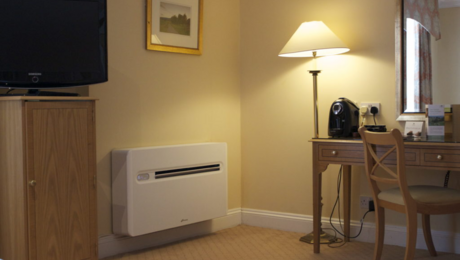Water-source heat pump
I’m wondering how to determine if a water-source heat pump (for space heating in an 8,000 DD climate) makes sense? Specifically, would it be more cost-effective to extract heat from the water of a stream 500 feet away and 50 feet lower in elevation compared to a mini-split air heat pump?
GBA Detail Library
A collection of one thousand construction details organized by climate and house part









Replies
Jack,
1. Check your local environmental regulations; there may be a law against pumping stream water to your house and returning the water to the stream at a different temperature. Heat pumps lower the water temperature in winter and raise it in the summer.
2. Considering the cost of the equipment and the excavation required to dig a trench that is 500 feet long, as well as the pumping energy required to move the water, my guess is that your proposal will cost much more than a ductless minisplit air-source heat pump. The Mitsubishi HyperHeat works down to about -17 degrees F; if it is much colder than that for long periods of time where you live, you might need electric-resistance backup.
Martin,
I thought of digging a shallow well near the stream for the water source, rather than pumping directly from the stream. The well would both filter the water of debris as well as protecting the pipe from damage by floating ice, etc. Hopefully, using a well would not trigger environmental regulations.
Any ideas of how much heat can be extracted from near-32 degree water? The air heat pumps are extracting heat from the air well below freezing, because air doesn't freeze (though the moisture in air can freeze), but if you extract enough heat from the water to drop the temperature below freezing you're in trouble.
I wondered about the energy costs of pumping the water such a distance. Your comments heightens my concern. I wonder if there is a rough, back of the envelope, way to calculate energy losses from pumping? Would it be more energy cost effective to pipe the waste water back to near its source, and thus use the weight of the waste water to help pull up the fresh water (at the cost of greater intra-pipe resistance and material cost), or would it be better to just dump the waste water out on the ground?
My back of the envelope guess is that you'd freeze a shallow well solid in no time flat when the weather starts getting cold and you'd be running on resistance heat for most of the winter. But consult a reputable, experienced GSHP installer to get an informed appraisal of your situation. This is not a project to make up as you go along unless you can afford to write off some seriously expensive mistakes.
I would not attempt to run any kind of surface water directly through a heat pump, especially that close to freezing. You might consider utilizing a closed loop antifreeze circuit in the water flow. For example, I have seen systems with copper coils containing the antifreeze circuit suspended in a cistern with creek water running through. It would be highly advisable to get something like this expertly designed.
Martin, James and Zac,
Thanks for your good thoughts. It does look like I should get expert advise. I wouldn't have thought a shallow well, essentially at river level, would freeze up in the winter -- at least as long as I didn't dump the chilled water back into the well. I get my potable water from a spring, which doesn't freeze up in the winter. The antifreeze circuit should like a good idea, to keep the heat pump clean.